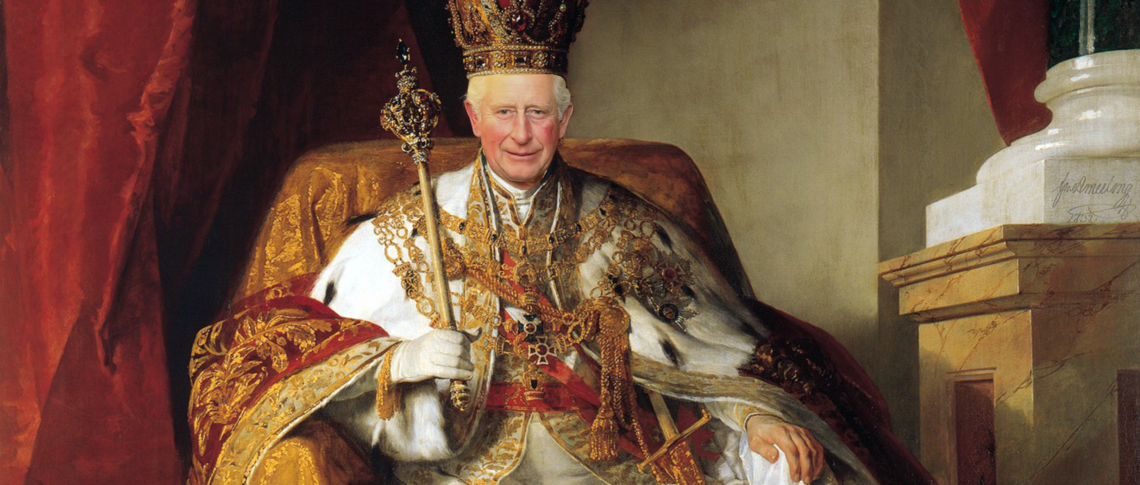Driving through the streets in a golden carriage, waving to the cheering crowds, then putting on a jewelled crown under the gaze of thousands of spectators from all over the world, and ending the celebrations with a big pop concert – that sounds like the dream of every Barbie Princess. In fact, that’s also what King Charles III has in mind for his official coronation this weekend. If all of it looks incredibly extravagant and expensive, that’s because it is. For born-and-bred monarchists, this event is the measure of all things. After all, this is where Charles’ claim to power is to be legitimised and the strength of the British monarchy presented to the world. But whether a lavish coronation ceremony will actually help Charles strengthen his position in the country is rather doubtful. In the current inflationary crisis, a public display of this sort might also have the opposite effect.
For some time now there has been strong criticism of the pompous coronation plans: too big, too expensive, simply inappropriate. And so, at a time of inflation in Great Britain, in order to avoid the impression that money is being wasted or too much is being expected of the people, Charles reacted with cost savings. Compared to the coronation of his mother, Queen Elizabeth II, which was attended by 8,000 guests, Charles invited only a modest 2,000. But the apparent concession nevertheless amounts to feigned modesty at the expense of the population. After all, the man has been king for quite some time already, and, in any case, the coronation is not paid for by the royal family but entirely by taxpayers – a group the British royals officially haven’t belonged to since 1993.
Out of touch with reality
According to the PA Media news agency, the coronation of Queen Elizabeth II 70 years ago cost £912,000, which would be around £50 million by today’s standards. The total cost to be incurred this time around will not be announced until after the festivities, but it is already assumed to be around £100 million. With expenses of this magnitude, the fact that Charles’ coronation costs a few million pounds less than originally planned provides little consolation, when more and more people in the UK lack the money needed for heating or groceries and struggle to pay their bills.
The luxury that King Charles III is indulging in at the expense of the British population seems completely out of step with the times and reminiscent of past centuries of the monarchy. Of course, it would be unrealistic to expect a traditionalist like Charles to completely leave behind the 1,000-year-old customs and rituals of his royal dynasty. But he could have used the coronation to send a signal to show that he is not indifferent to the nation’s problems, that he is willing to help create a better future by paying for the pomp and pageantry himself. With his standard of living, it shouldn’t be much of a problem to finance the festivities on his own. According to the Guardian, his personal fortune is estimated at nearly £2 bn. This includes numerous estates, luxury vehicles, dozens of racehorses and an art collection with paintings from Marc Chagall to Salvador Dalí. King Charles would not even have to sell his stamp collection to cover the cost of the coronation several times over.
The majority of the population has very little interest in Charles or his coronation and, above all, does not want one thing: to pay for this fun.
But in his royal career to date, Charles has never been particularly well known for his rapport with the populace. And just a few hours after he was proclaimed king, he proved that this will not change anytime soon: At St. James’s Palace, with a grimace and frantic hand signals, he imperiously instructed employees to clear away inkwells and a tray of pens before he could sign an oath. This isn’t the first time that Charles has somewhat lost touch with reality, focussing more on himself rather than the British people. For decades, he has dedicated his time to his passion for alternative medicine, for which he is one of the most influential advocates not only in Great Britain but worldwide. With the aim of helping alternative medicine achieve a breakthrough in Britain’s chronically underfunded National Health Service (NHS), he has not been above political interference, even going so far as to urge ministers to change public spending plans in favour of complementary medicine and homeopathy.
While alternative medicine might seem to be a medical gimmick for wealthy people who basically don’t need to worry about their health care, it would be less of a problem if Charles III didn’t have a particular soft spot for unproven or disproven forms of treatment. That is why he has repeatedly come into conflict with doctors and researchers, even with the only British professor of complementary medicine, Edzard Ernst, who repeatedly expressed concern about Charles’ attitude: ‘No matter how disappointing or even alarming my study results or those of colleagues were, he remained firmly convinced that alternative medicine was good medicine, a lot better than conventional medicine.’
Getting weary of the Crown
But getting back to the coronation, for which the entire tourism and event industry is running at top speed: fully booked flights, euphoric campers with tents along the route in London and lots of coronation folderol are all here in great abundance. But apart from the die-hard fans of the royals and the fascinated international visitors, the majority of the population has very little interest in Charles or his coronation and, above all, does not want one thing: to pay for this fun.
And no wonder: the coronation is part of a series of royal dubiousness that has drawn ever more outspoken criticism, especially since the Queen’s death. Whether it’s been Her Majesty’s dealing with atrocities committed during the colonial period, accusations of racism, questionable donations, or abuse scandals amongst relatives, Charles’s handling of criticism of the British nobility or himself has so far tended to follow a familiar pattern: ignore, smile and wave. As a result, the monarchy is losing, above all, the younger generation. Most of those under 35 are not so sure how important it is to them that the monarchy be preserved in their country. Another poll found that in the same age group, more than a third would actually prefer a republic. But those results pertain only to Great Britain. Things are no better in many other parts of the world: in several of the 15 countries in which Charles III is the head of state, disengagement from the British crown is being discussed. In addition to island states such as Antigua and Barbuda, this also includes Australia. Barbados already took that step in 2021.
With the attention given to the long-standing rivalry between Harry and William, there is of course little room for the country’s real problems, but it does show the British monarchy’s unreflective sense of entitlement.
For the rest, the question is: Can people simply sit out King Charles’s reign for the next few years, or will the British monarchy perhaps do away with itself over time? Unfortunately, it’s just as unlikely that the next generation will be able to handle it better than their father. Even if the heir to the throne William and his wife Kate definitely score more sympathy points from the British than their cranky head of family, the young royals are likewise stuck in the past. Their everyday routine also consists of lots of smiling for the cameras and rehashing old family feuds.
You can’t really blame Harry and Meghan for getting tired of the monarchy and giving up their royal jobs to instead conquer the entertainment industry. While soppy reality TV is certainly not to everyone’s taste, there’s clearly money to be made from the absurdity of royal troubles. Whether William and Harry are arguing over why one got to wear a beard at his wedding and the other didn’t, or why Kate wouldn’t lend Meghan her lip gloss at an event, the profound insights in their own Netflix series and in Harry’s bestselling biography are well rewarded.
Harry’s memoir became the fastest-selling non-fiction book of all time in its first week of publication. With the attention given to the long-standing rivalry with his older brother William, there is of course little room for the country’s real problems, but it does show the British monarchy’s unreflective sense of entitlement. At the end of 2015, Harry decided to get involved in the fight against the climate crisis, and in doing so, he clashed with his brother, who is said to have been adamant that Africa was ‘his thing’ so that his brother would quickly look for another topic. Who’s to tell dear William that Africa isn’t his? Statements like that should also raise questions as to whether this family should be taxed to keep a country together when even dealings within its closest circle are an absolute disaster.
Perhaps, the British nobility should take Harry’s example and not get so hung up on governing a country, and go out and gain their own experiences without being a burden on the British people. If Charles’s coronation heralds the end of the monarchy after all, then its festivities would probably be bearable.






